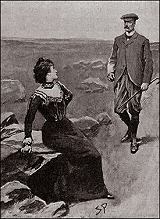“We have books, we have our studies, and we have interesting neighbours. Dr. Mortimer is a most learned man in his own line. Poor Sir Charles was also an admirable companion. We knew him well and miss him more than I can tell. Do you think that I should intrude if I were to call this afternoon and make the acquaintance of Sir Henry?”
“I am sure that he would be delighted.”
“Then perhaps you would mention that I propose to do so. We may in our humble way do something to make things more easy for him until he becomes accustomed to his new surroundings. Will you come upstairs, Dr. Watson, and inspect my collection of Lepidoptera? I think it is the most complete one in the south-west of England. By the time that you have looked through them lunch will be almost ready.”
But I was eager to get back to my charge. The melancholy of the moor, the death of the unfortunate pony, the weird sound which had been associated with the grim legend of the Baskervilles, all these things tinged my thoughts with sadness. Then on the top of these more or less vague impressions there had come the definite and distinct warning of Miss Stapleton, delivered with such intense earnestness that I could not doubt that some grave and deep reason lay behind it. I resisted all pressure to stay for lunch, and I set off at once upon my return journey, taking the grass-grown path by which we had come.
It seems, however, that there must have been some short cut for those who knew it, for before I had reached the road I was astounded to see Miss Stapleton sitting upon a rock by the side of the track. Her face was beautifully flushed with her exertions, and she held her hand to her side.
“I have run all the way in order to cut you off, Dr. Watson,” said she. “I had not even time to put on my hat. I must not stop, or my brother may miss me. I wanted to say to you how sorry I am about the stupid mistake I made in thinking that you were Sir Henry. Please forget the words I said, which have no application whatever to you.”
“But I can’t forget them, Miss Stapleton,” said I. “I am Sir Henry’s friend, and his welfare is a very close concern of mine. Tell me why it was that you were so eager that Sir Henry should return to London.”
“A woman’s whim, Dr. Watson. When you know me better you will understand that I cannot always give reasons for what I say or do.”
“No, no. I remember the thrill in your voice. I remember the look in your eyes. Please, please, be frank with me, Miss Stapleton, for ever since I have been here I have been conscious of shadows all round me. Life has become like that great Grimpen Mire, with little green patches everywhere into which one may sink and with no guide to point the track. Tell me then what it was that you meant, and I will promise to convey your warning to Sir Henry.”
An expression of irresolution passed for an instant over her face, but her eyes had hardened again when she answered me.
“You make too much of it, Dr. Watson,” said she. “My brother and I were very much shocked by the death of Sir Charles. We knew him very intimately, for his favourite walk was over the moor to our house. He was deeply impressed with the curse which hung over his family, and when this tragedy came I naturally felt that there must be some grounds for the fears which he had expressed. I was distressed therefore when another member of the family came down to live here, and I felt that he should be warned of the danger which he will run. That was all which I intended to convey.”
“But what is the danger?”
“You know the story of the hound?”

“I do not believe in such nonsense.”